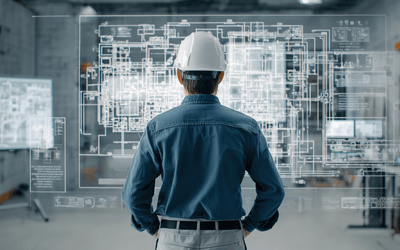With demand and job opportunities in the Renewable Energy sector rocketing, we thought it was time to shed some light on another one of the most popular vacancies we’re recruiting for.
In this blog, we’re going to focus on the role of Project Development Managers. These are individuals who will generally be involved in large scale projects (otherwise known as utility scale projects) covering Solar Energy, Wind Energy or Battery Storage.
But what exactly do they do, and what skills do they need? Here’s everything you need to know!
What does a Project Development Manager in Renewables do?
The clue is ever so slightly in the job title!
In a nutshell, you’ll strategically manage the development of Renewable Energy projects and potential projects. It’s a very important commercial role which involves a lot of planning, negotiating and due diligence.
While the technical and engineering side of things is important, this is a broad role which will see you touch on things like sales, marketing, and finance.
As a Project Development Manager, you must liaise with a raft of stakeholders – developers, service operators, suppliers, and local councils — Also work fairly closely with your own finance and legal teams.
Some of your regular duties can involve:
- Financial and commercial modelling
- Contract analysis and due diligence
- Coordinating planning applications and Environmental Impact Assessments (EIAs)
- Procuring and negotiating lease agreements, development agreements and purchase agreements
- Ensuring the project delivery is following the correct internal protocol
- Overseeing relationships with internal and external stakeholders
The typical salary for this role can range from £55,000-£70,000, however, this is dependent on experience and also the size of the organisation you’re joining. A lot of roles can be global in nature, depending on where the business is looking to operate, so international travel may be also part of your remit.
What do I need to become a Project Development Manager within Renewables?
As mentioned earlier, this is a highly commercial role. Therefore you’ll need strong commercial acumen and analytical skills. A big part of your job will be to think strategically — understanding the energy landscape, analysing where the opportunities are, and what factors could impact the success of a project.
There will be lots of legal due diligence, and you’re likely to be dealing with high value contracts. If you enjoy absorbing information and have strong attention to detail, this could be a great fit for you.
In terms of technical skills, you’ll need to be quite computer literate, while there’ll also be a lot of financial modelling and budget management to do — so a good grasp of maths is key.
Just as relevant are your soft skills, as the job requires you to liaise with many different stakeholders. The ability to negotiate and influence key decision makers are two of the most important things, while you also need to be flexible and a strong team player.
Qualifications wise, almost all roles will expect a Bachelor’s degree in a related field — for example, Engineering, Legal, Business, Planning, or Environmental. You may also find it handy to take a procurement course, as it will be an important part of your job. This could give your CV an extra element that sets you apart from the competition.
Most companies will expect you to have around 5 years experience in Project Development Management, and any experience in land securing and permitting would be highly desirable. If the company you’re applying for is a global one, prior experience working with a multinational company would be very helpful.
Finally, we mentioned flexibility being an important soft skill, and this also applies in terms of travel. Many roles require occasional visits to overseas sites, so a willingness to travel would be another tick.
How can I progress?
As you’ll need around 5 years’ experience, your initial entry point is likely to be as a Project Developer, where you will be focused more on the day-to-day operations. As you climb up the ladder to Project Development Manager (and then Senior Project Development Manager), your responsibilities will become more strategic, while also managing others.
Ultimately you could end up as a Head of Project Development. At this stage, you’ll still be identifying opportunities and conceptualising deals, but there will be a real focus on developing the company’s market presence through C-suite networking and attending conferences.
Another route could be to cross over into a Business Development Manager role. This is another highly commercial position and will see you oversee all aspects of a sales and project pipeline, while also managing a team of Business Development Representatives. If you enjoy the relationship building and selling side of things, then you may find this to your liking.
What else do I need to know?
It’s important to not confuse Project Development Managers with Project Managers.
The latter focus on the technical and day-to-day aspects of a project. On the other hand, Project Development Managers focus on the initial delivery of sites for development. It’s a broader and more strategic role, so there will be less of an emphasis on day-to-day operations.
Sometimes there are instances of the same person doing both roles; however, this is quite rare. It can be achieved when the person has exceptional skills and experience and even then it only works on smaller projects. For large-scale projects, which are more common in Renewables, the two functions are normally split.
Finally, it’s important to remember that a big part of your role as Project Development Manager will be to know about various rules and regulations. Examples include environmental laws and planning permissions, as well as legislation specific to the Renewable Energy industry. The latter can be quite fast-moving, so somebody who relishes the opportunity to learn and keep up with the latest developments will flourish.
If you would like to see more of our Renewables career guidance you can view our career advice page here.









